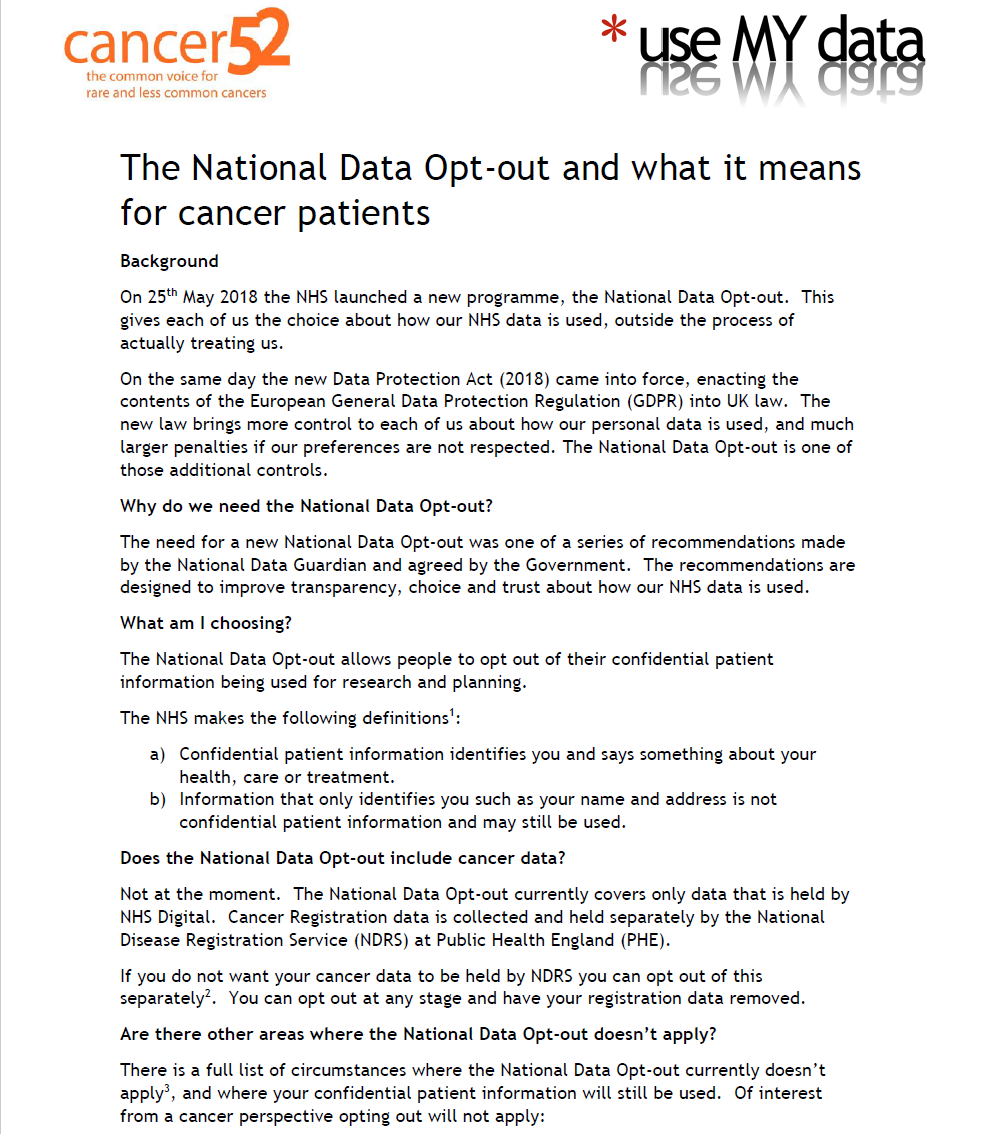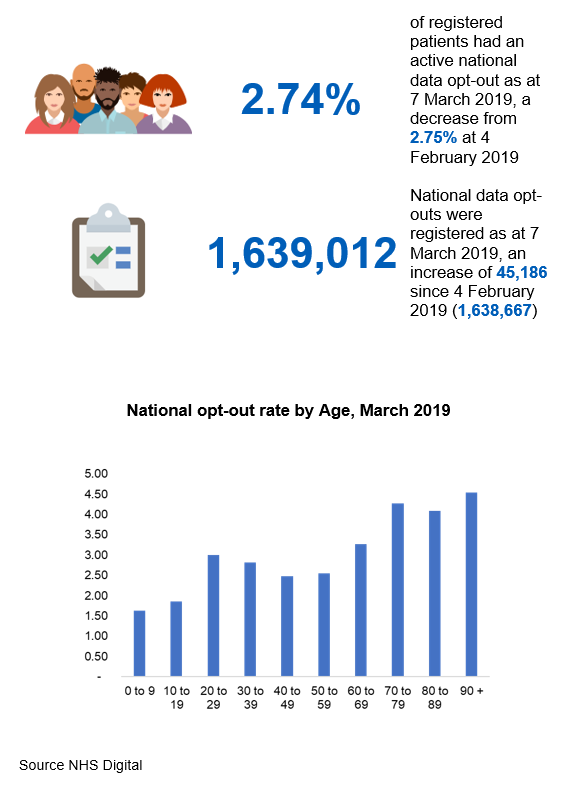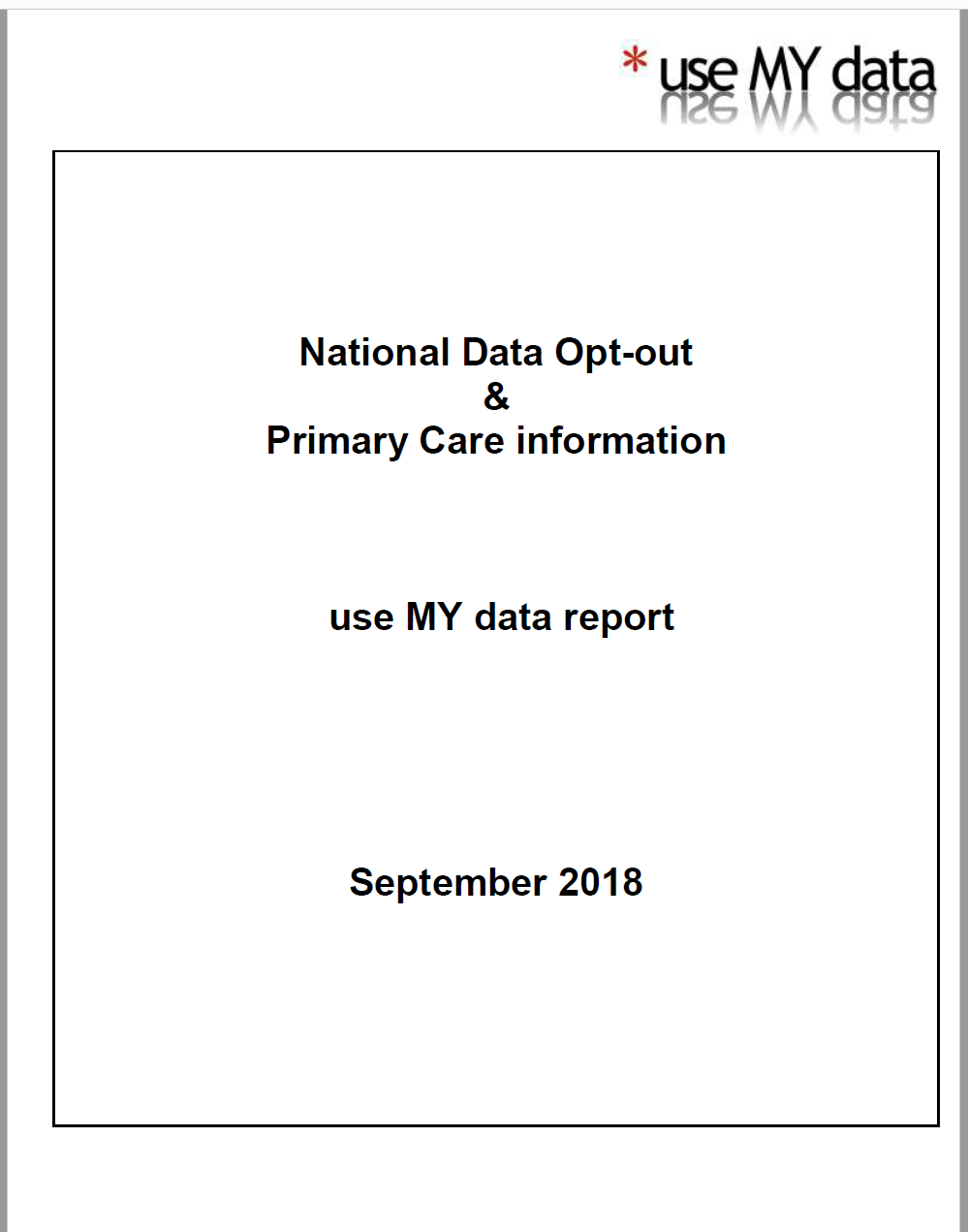National Data Opt-Out updated figures - July 2021
NHS Digital have published updated figures for the Natinal Data Opt-out.
- There were 3,032,917 national data opt-outs as at 1st July 2021, an increase of 1,275,153 compared to 1 June 2021.
- As at 1 July 2021 4.97 per cent of the population registered with a GP practice have a national data opt-out, an increase of 2.08 percentage points compared to 1 June 2021.
Details are available on the NHS Digital website.
National Data Opt-Out implementation delay - March 2020
NHS Digital and NHSX have confirmed that implementation of the National Data Opt-out will be pushed back to September 2020 at the earliest.
"The health and social care system is going to face significant pressures in the coming months due to the COVID-19 outbreak. Staff will need to work in different ways than usual and we want to ensure that they can focus on responding to these events.
We have, therefore, made the decision to extend the compliance deadline for the national data opt-out for six months up to 30 September 2020, at which point we will review the position."
There are details here, including a link to "the letter from NHSX and NHS Digital to health and care colleagues."
Included within this letter:
"The national data opt-out does not apply to the disclosure of confidential patient information where there is an overriding public interest in the disclosure, i.e. the public interest in disclosing the data overrides the public interest in maintaining confidentiality. Our expectation is that the national data opt-out will not apply to data sharing for the purposes of responding to COVID-19."
What does the National Data Opt-Out mean for cancer patients? - November 2018
 use MY data and Cancer52 have produced an updated
short paper
specifically looking at the implications of the National Data Opt-out for cancer patients. [November 2018]
use MY data and Cancer52 have produced an updated
short paper
specifically looking at the implications of the National Data Opt-out for cancer patients. [November 2018]
This includes changes made to the way that Public Health England are managing the National Data Opt-out requests.
National Data Opt-out numbers update - March 2019

The National Data Opt-out publication provides statistics on the volumes of national data opt-outs. The National Data Opt-out was introduced on 25th May 2018 following recommendations from the National Data Guardian and it prevents the individual’s confidential patient information from being shared for purposes beyond their individual care across the health and care system in England.
It replaces the previous Type 2 patient opt-outs which enabled patients to register an opt-out via their GP Practice. It includes the number of people who have had a national data opt-out.
Extracting from the published figures published in December 2018 showed an increase of just 260 newly recorded opt-outs when compared to the previous month. The January, February and March 2019 extracts show a similarly small increase of just 250, 857 and 345. Previous monthly increases had been in the order of several thousand, so the low monthly increases in the December, January, February and March figures remain notably different from previous months.
In terms of the opt-out process, any patient that had a type 2 opt-out recorded on a GP system or before 11 October 2018 has had it automatically converted to a national data opt-out. After that point, new type 2 opt-outs recorded on GP systems will not be converted.
The proportions of opt-outs across different age groups continue to range from 1.7% to 4.3%.
Figures published by both GP Practice and CCG continue to show variation. In fact just 1% of GP Practices account for 16% of the total number of opt-outs. And 10% of the total number of opt-outs come from just 0.4% of the practices in the country.
At the CCG level, the proportion of opt-outs ranges from over 10% in Oldham CCG to just 0.3% in Bradford City CCG. A short breakdown of the overal national trends is shown below, with the full set of tables available here on the NHS Digital site
NHs Digital have stated that this publication will no longer be released monthly. It will now be released annually or when the national opt-out rate changes by more than 0.1 per cent.
Date |
Opt-outs |
Population |
Increase |
Percentage |
7 March 2019 |
1,639,012 |
59,714,859 |
345 |
2.74% |
4 February 2019 |
1,638,667 |
59,669,673 |
857 |
2.75% |
1 January 2019 |
1,637,810 |
59,607,191 |
250 |
2.75% |
1 December 2018 |
1,637,560 |
59,574,450 |
260 |
2.75% |
1 November 2018 |
1,637,300 |
59,503,377 |
8,014 |
2.75% |
1 October 2018 |
1,629,286 |
59,409,696 |
5,751 |
2.74% |
1 September 2018 |
1,623,535 |
59,297,331 |
9,930 |
2.74% |
1 August 2018 |
1,613,605 |
59,234,413 |
10,695 |
2.72% |
1 July 2018 |
1,602,910 |
59,178,163 |
n/a |
2.71% |
National Data Opt-out and Primary Care information - use MY data report, September 2018

The National Data Opt-out was introduced on 25 May 2018. In the initial months after its introduction, information from several use MY data members indicated that their GP practice had given either confusing or erroneous information about the National Data Opt-out and patient data choices.
While hoping that the examples were not typical, we thought it would be useful to find out by casting the net wider amongst our membership, with the aim of feeding back in the first instance to the Royal College of General Practitioners.
use MY data has been actively engaging with primary care for some time, in order to understand the challenges primary care faces in relation to patient data and learn how members might assist in this area.
We ran a survey of our membership throughout August and the results are presented in the report. Prior to publication, we have shared the report with:
- Royal College of General Practitioners (RCGP): the lead for the RCGP’s Patient Data Choices Programme & the RCGP’s representative on the National Data Opt-out Advisory Board
- NHS Digital: representative on the National Data Opt-out Advisory Board
- NHS England: representative on the National Data Opt-out Advisory Board
Please direct any queries to coordinator@usemydata.org.uk
National Opt-out Newsletter update - July 2018
Patient materials
Documents to help the workforce communicate the national data opt-out to patients are available on the NHS Digital website. This includes downloadable PDFs of the poster and handout. Printed copies have been sent out to GP practices and NHS trusts, they will also be sent to all dentists and pharmacies by the end of July. The British Sign Language video, audio and braille, as well as other language translations of the handout are also available. Organisations can order materials and download the screen text for patient waiting rooms, visit the NHS Digital website for further details.
TPP type 2 objections issue
NHS Digital was made aware that some people who had set a type 2 objection (the system in place before the national data opt-out was introduced in May this year) had not had their preference set on our system. The error was due to a system supplier error which meant that NHS Digital did not receive the information about these opt-outs. Only patients registered at a GP practice using TPP (SystmOne) were affected, and the error only applied to people who had registered type 2 objections after 31 March 2015.
As soon as NHS Digital realised there was an error we stopped sharing data where type 2 objections should apply and we reported the issue to the Information Commissioners Office (ICO). We are also in the process of writing to all patients that were impacted to explain and apologise for what has happened. NHS Digital takes its responsibility to honour patient’s wishes seriously and we are doing everything we can to put this right.
On 25 May 2018 the health and care system introduced a national data opt-out and existing and future type 2 objections (set up until 1 October 2018) will automatically be changed into a national data opt-out.
National Data Opt-out Q&As
A Q&A document detailing answers to frequently asked questions is available for organisations to download. The list of questions has been collated by the programme team over the last year and features questions regularly asked by the workforce on a variety of subjects including what happens when an opt-out is set and the plan for upholding. Further information can be found in the various factsheets and the National Data Opt-out operational policy guidance, all of which are on the NHS Digital website.
Events and webinars for GP practices
The Royal College of General Practitioners is organising a series of events and webinars on the broader topic of Patient Data Choices. Visit the RCGP website to view the Patient Data Choices Toolkit and book your place on an RCGP Patient Data Choices webinar or event.
Applying opt-outs
We are encouraging organisations to start to think about whether they disseminate confidential patient information for purposes beyond individual care and will therefore need to apply national data opt-outs by 2020. If your organisation will be applying national data opt-outs in the future it would be helpful to start to identify colleagues who will lead on this piece of work. Considerations will need to be made around when national data opt-outs need to apply in line with the policy; the usage and dissemination of data for purposes beyond individual care; when the organisation will start to implement the upholding solution and how to ensure the technical solution will be communicated to all relevant colleagues within the organisation.
Upholding solution
NHS Digital is working with the workforce to test a solution for health and care organisations to uphold national data opt-outs by 2020. The programme is working with NHS trusts, GP practices and local authorities to organise pilots of the upholding solution. Pilots are planned to start in the Autumn of this year. Volunteer to take part in the pilot by emailing the programme team.
Get in touch
If you have any comments or questions on any of the updates above or about the work of the national data opt-out programme, please email the programme team for further information and support
Subscribe to the NHS Digital newsletter
You can sign up now to get the latest updates about the national data opt-out from NHS Digital.
National Data Guardian’s 2017 Report
The National Data Guardian (NDG) for Health and Care has published a report reviewing Dame Fiona Caldicott's first term in the office and looking at her current priorities. The publication of the National Data Guardian 2017 report: impact and influence for patients and service users marks just over three years since Dame Fiona was appointed as the first NDG.
The report sets out a clear case for the independent advice and challenge the NDG role provides to ensure that data collected by the NHS and social care services is properly safeguarded and used appropriately to improve care. It reinforces the fundamental requirement of building public trust for successful advancements in health and care based on data sharing.
Government Response to the National Data Guardian’s (NDG) Review (12th July 2017)
The Government published its response to the National Data Guardian’s (NDG) Review of Data Security, Consent and Opt-Outs. ‘Your Data: Better Security, Better Choice, Better Care’ on 12 July 2017. The response is available here: Government Response, 12th July 2017
Dame Fiona issued an accompanying statement
The Government has accepted all of the recommendations from the NDG’s review. The benefits of sharing data are emphasised throughout the response, “we are also keen to support the use of patient data in appropriate circumstances and anonymised data for research, and will learn from examples where this is being done effectively”. Several case studies are included to highlight the rewards of using and sharing patient data.
The key recommendations regarding data sharing and opt-outs:
- Ensure that the national opt-out is implemented effectively from March 2018, engaging the public to understand what their data is used for and by whom, and the choices that they can make around that use. Ensure that the NHS and social care manages the transition to the national opt-out effectively by 2020.
- Support professionals to implement the national opt-out successfully.
- Support legislation to put the role of the NDG on a statutory footing.
- Implement stronger measures to protect personal data, through UK data protection legislation to introduce more severe penalties for data breaches and to deter reckless or deliberate misuse of information from May 2018.
- Work with other stakeholders, including Understanding Patient Data, to develop communication tools to explain effectively to the public, data and information sharing in health and care.
- Ensure that NHS Digital implements a tool to enable patients to access and understand how their data has been used nationally by March 2020
Existing Type 1 & 2 opt outs are addressed. Type 2 opt outs will be transitioned and Type 1 opt outs will be honoured until March 2020. There is information about this on page 26 of the response.
Dame Fiona has also written an article in the Times published today, which I attach and in which Dame Fiona says “Yet my support for the creation of a simple data opt-out does not mean that I want people to use it. I have confidence in the system to use my data responsibly to improve services for all”
National Data Guardian's Review published (6th July 2016)
The National Data Guardian for Health and Care has today published her Review of Data Security, Consent and Opt-Outs.
Dame Fiona Caldicott, the National Data Guardian for Health and Care (NDG), today publishes recommendations to strengthen the security of health and care information secure and to help the public make informed choices about how their data is used.
The proposals are contained in the National Data Guardian for Health and Care: Review of Data Security, Consent and Opt-out. The recommendations are made to the Secretary of State for Health, Jeremy Hunt, following his commissioning of reviews from the NDG and the Care Quality Commission (CQC), which has today also published its report on data security in the NHS.
Recommendations
The National Data Guardian has developed ten new data security standards to apply to all organisations which hold health or care information. Dame Fiona is calling on leaders of health and social care organisations to demonstrate clear accountability and responsibility for data security, just as they do for clinical and financial management and accountability.
Dame Fiona is also calling for a much more extensive dialogue with the public about how their information is used and the benefits, from researchers making breakthroughs in life-saving medicines to regulators spotting quickly when things go wrong.
For those who do not want their confidential information to be used for purposes other than their direct care, Dame Fiona has developed a new opt-out. She has also reaffirmed that whether people opt out or not, they should be reassured that their health and care information will only ever be used if the law allows and never for marketing or insurance purposes, unless they separately consent to this.
Next steps
Dame Fiona has called for a full and comprehensive public consultation on her recommendations and further testing of the proposed consent/opt-out model.
Dame Fiona is clear that that it will be important to hear the views of patients, health and care professionals, researchers, commissioners and others in this consultation and beyond. We hope you will be able to play your part.
Read the Review
Read the Press Release
Video: Dame Fiona explains
Read the CQC Report
(Remaining parts of this page have been extracted directly from several sources)
New Models of Consent
Speaking at the NHS Innovation Expo in Manchester, the Health Secretary announced a review of standards of data security for patients’ confidential data across the NHS to be carried out by the Care Quality Commission (CQC). A clarification shortly afterwards highlighted Dame Fiona Caldicott's contribution to the review, which is shown below:
[Source: GOV.UK]
18 September 2015 - clarification of Dame Fiona Caldicott’s contribution to the review
The National Data Guardian for health and care, Dame Fiona Caldicott, will contribute to this review by developing clear guidelines for the protection of personal data against which every NHS and care organisation will be held to account. She will provide advice on the wording for a new model of consents and opt-outs, to enable patients to make an informed decision about how their data will be shared.
[Source: Health Secretary outlines vision for use of technology across NHS, September 2015]
Review of Informed Choice for Cancer Registration
In April 2016, Cancer Research UK and Macmillan Cancer Support announced a joint Review of Informed Choice for Cancer Registration, to include engagement events for people affected by cancer.
The findings of the review will help inform a decision by the government about how cancer registration will be managed in the future.
[Source: Cancer Research UK and Macmillan Cancer Support]
What is happening in the review?
Cancer Research UK and Macmillan Cancer Support are reviewing how cancer patients in England could be better informed about the use of their data in cancer registration, and how they can choose whether their data are included.
- We expect this review to help inform an important decision by the government about how cancer patients can choose whether their data are included in the cancer registry.
- The review will run until July 2016, when we will report to government. We expect to publish our findings by September 2016.
The full details are available here from both charities
[Source: Macmillan Cancer Support, Review of Informed Choice for Cancer Registration]
[Source: Cancer Research UK, Review of Informed Choice for Cancer Registration]
|
|